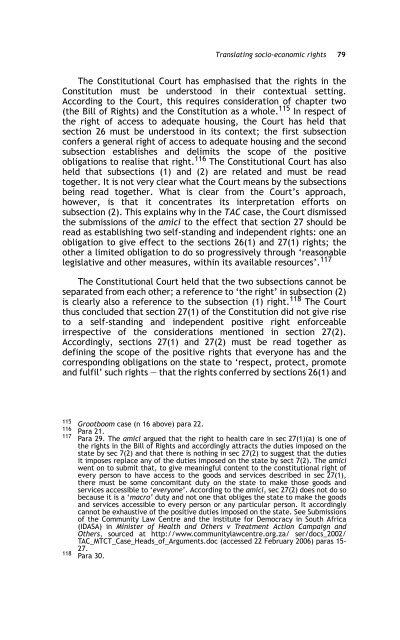LITIGATING SOCIO-ECONOMIC RIGHTS IN SOUTH AFRICA - PULP
LITIGATING SOCIO-ECONOMIC RIGHTS IN SOUTH AFRICA - PULP
LITIGATING SOCIO-ECONOMIC RIGHTS IN SOUTH AFRICA - PULP
Create successful ePaper yourself
Turn your PDF publications into a flip-book with our unique Google optimized e-Paper software.
Translating socio-economic rights 79<br />
The Constitutional Court has emphasised that the rights in the<br />
Constitution must be understood in their contextual setting.<br />
According to the Court, this requires consideration of chapter two<br />
(the Bill of Rights) and the Constitution as a whole. 115 In respect of<br />
the right of access to adequate housing, the Court has held that<br />
section 26 must be understood in its context; the first subsection<br />
confers a general right of access to adequate housing and the second<br />
subsection establishes and delimits the scope of the positive<br />
obligations to realise that right. 116 The Constitutional Court has also<br />
held that subsections (1) and (2) are related and must be read<br />
together. It is not very clear what the Court means by the subsections<br />
being read together. What is clear from the Court’s approach,<br />
however, is that it concentrates its interpretation efforts on<br />
subsection (2). This explains why in the TAC case, the Court dismissed<br />
the submissions of the amici to the effect that section 27 should be<br />
read as establishing two self-standing and independent rights: one an<br />
obligation to give effect to the sections 26(1) and 27(1) rights; the<br />
other a limited obligation to do so progressively through ‘reasonable<br />
legislative and other measures, within its available resources’. 117<br />
The Constitutional Court held that the two subsections cannot be<br />
separated from each other; a reference to ‘the right’ in subsection (2)<br />
is clearly also a reference to the subsection (1) right. 118 The Court<br />
thus concluded that section 27(1) of the Constitution did not give rise<br />
to a self-standing and independent positive right enforceable<br />
irrespective of the considerations mentioned in section 27(2).<br />
Accordingly, sections 27(1) and 27(2) must be read together as<br />
defining the scope of the positive rights that everyone has and the<br />
corresponding obligations on the state to ‘respect, protect, promote<br />
and fulfil’ such rights — that the rights conferred by sections 26(1) and<br />
115 Grootboom case (n 16 above) para 22.<br />
116 Para 21.<br />
117<br />
Para 29. The amici argued that the right to health care in sec 27(1)(a) is one of<br />
the rights in the Bill of Rights and accordingly attracts the duties imposed on the<br />
state by sec 7(2) and that there is nothing in sec 27(2) to suggest that the duties<br />
it imposes replace any of the duties imposed on the state by sect 7(2). The amici<br />
went on to submit that, to give meaningful content to the constitutional right of<br />
every person to have access to the goods and services described in sec 27(1),<br />
there must be some concomitant duty on the state to make those goods and<br />
services accessible to ‘everyone’. According to the amici, sec 27(2) does not do so<br />
because it is a ‘macro’ duty and not one that obliges the state to make the goods<br />
and services accessible to every person or any particular person. It accordingly<br />
cannot be exhaustive of the positive duties imposed on the state. See Submissions<br />
of the Community Law Centre and the Institute for Democracy in South Africa<br />
(IDASA) in Minister of Health and Others v Treatment Action Campaign and<br />
Others, sourced at http://www.communitylawcentre.org.za/ ser/docs_2002/<br />
TAC_MTCT_Case_Heads_of_Arguments.doc (accessed 22 February 2006) paras 15-<br />
27.<br />
118 Para 30.
















